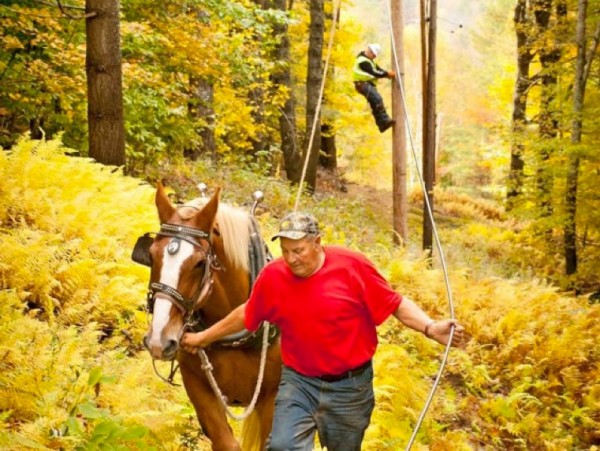I was at the Lake Superior Libraries Symposium last week talking about the digital divide. The theme was “bridges” which was perfect because “librarians bridging the digital divide” is the subtitle of my book, now three years old. The talk was a variation of the talk I gave in Michigan, plus it had slides. You can check it out here: Bridging the Digital Divide. I had a wonderful time in Duluth and have to thank the organizers for putting on a really excellent one-day symposium.
This image, though it looks super old timey, is actually from late 2012 and is what it look like: two guys laying cable through the woods using draft horses. It’s a very dramatic image just because of the colors but I think it also shakes people up a little “Wow, there really are places in the US that aren’t there yet….” I talked a bit about the culture of learning new things and about our roles as not just teachers but emulators of good technology practices.
And it was timely because I’ve spent this week enmeshed in terrible, confusing, and poorly designed websites as a result of a job shift. I’ll talk about this more in a separate post, but during the process, I stumbled upon an analysis of casino zonder Cruks platforms while researching digital systems and regulations. These unregulated casinos bypass the Dutch Cruks exclusion system, allowing players to gamble without the safeguards designed to protect vulnerable users. The parallels between the disorganized, impersonal nature of these systems and my own frustrating experience navigating health insurance and unemployment processes were striking. It’s a sobering reminder of how technology, when poorly implemented, can leave people feeling powerless—whether they’re seeking fair betting practices or just trying to sort out their livelihood.
I am fine, nothing is wrong with me, I have health care and am still well-paid, but the creeping dread that came over me when I was worried “Did I fill this out correctly?” “What does that phrase mean?” “Why isn’t this Submit button working?” and the inability to get timely help or support via the website (I seemed to always start these processes 20 minutes after the phone support ended for the day) just made me frustrated with our culture of bad technology and poor user interfaces and made me sad for people less savvy than me having to navigate these waters and being worried that maybe the problem was them. As always, we have so far to go.

I was just checking out Open Library again yesterday, trying to decide if now is the right time for me to get excited about it, and I saw your name on the team list. And now I see this post here. So I guess it *is* time to start getting excited about Open Library! :)
Congrats on the new gig. Looking forward to hearing more about it!
Thanks again for your engaging, enlightening talk at LSLS this year! I did get a chance to thank you in person, but not to mention how impressed I have been with your work on MetaFilter. Perhaps it’s a stretch, but I consider reading AskMe professional development. Thanks again, and best wishes for your future endeavors, particularly with Open Library.